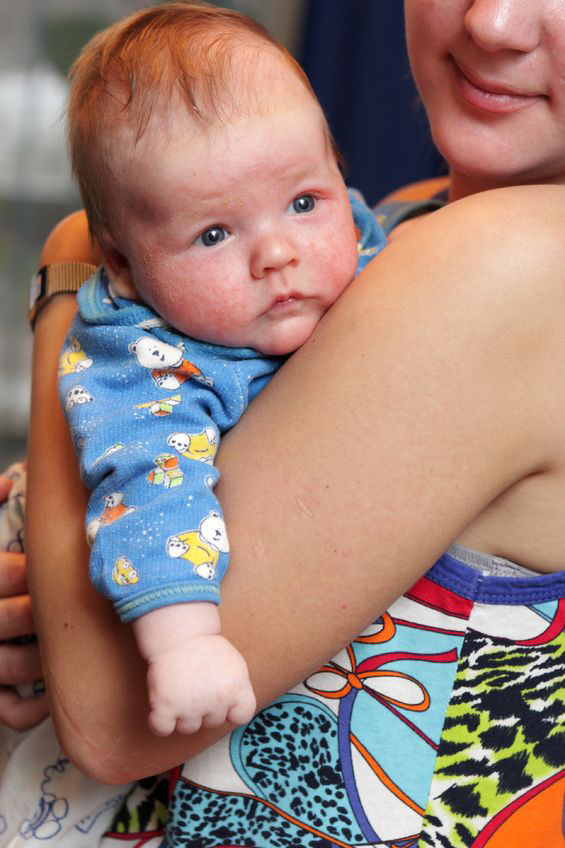Babies can have allergies and intolerances to food just as children and adults can. The most common culprit causing a reaction for babies is cows’ milk protein and a reaction to soy protein is also very common. There are various names for this including cows’ milk protein allergy (CMPA), cows’ milk protein intolerance (CMPI), food sensitivity and related conditions such as allergic proctocolitis or food protein-induced enterocolitis syndrome (FPIES). This article discusses infant food allergy with a particular focus on milk allergy in babies including common symptoms, causes, diagnosis and treatments.
Can breastfed babies have milk allergies?
Although it is much more likely that a baby would react to a food he was given directly such as infant formula or dairy produce; an exclusively breastfed baby can have an allergy or intolerance to tiny traces of proteins from his mother’s diet passing into breast milk. The most common food to trigger an allergic reaction through human milk seems to be cows’ milk protein.12 Less than 1% of exclusively breastfed babies are said to develop allergic reactions to cows’ milk proteins in their mother’s milk3 compared to 1.9-4.9% infants who have CMPA generally4.
What other foods can cause allergies?
In addition to cows’ milk products, other common allergenic foods include peanut, tree nuts, egg, wheat, soy, sesame, fish and shellfish5 but any food might cause a sensitivity in an individual mother or baby.
What about lactose intolerance?
Lactose intolerance is not the same as CMPA, but a food allergy may cause symptoms of lactose intolerance due to damage to the baby’s gut affecting the digestion of lactose.6 See Lactose Intolerance in Babies for more explanation.
Allergy or intolerance? What is the difference?
A food intolerance is an inability to digest a certain food or substance in the food. Symptoms might include tummy ache, bloating, diarrhoea, flatulence or headache. Symptoms may be similar to food allergy but are not life threatening.7
A food allergy is more serious than an intolerance but less common. The body makes an immune system reaction to a food, even tiny traces of the food, and occasionally this can be life threatening e.g. anaphylaxis. Allergic responses tend to be either:
- Immediate (IgE-mediated). Symptoms such as swollen eyes and lips, hives, rashes, or difficulty breathing could be seen within minutes to two hours.8
- Delayed (non-IgE-mediated). Symptoms such as eczema, diarrhoea/constipation, blood in the stool, respiratory symptoms, or reflux might appear within hours to several days.
- It’s possible to have a combination of types.
How quickly can allergies be triggered through breast milk?
An allergic individual can react to trigger foods eaten directly almost immediately. But how long does it take for cows’ milk and other allergens in a mother’s diet to affect her breastfed baby? Kelly Bonyata IBCLC says:
Food reactions may occur within minutes, but symptoms in breastfed babies more commonly show up 4-24 hours after exposure. If baby has an acute reaction to a new food, or to a food that mom ate a large amount of, then he will probably be back to normal within a couple of hours. If baby is sensitive to a food that mom eats frequently, symptoms may be ongoing.
Symptoms of milk allergy
The most common symptoms of food allergy in the breastfed baby include:
- Stomach or intestinal problems such as vomiting or reflux, signs of tummy ache/colic or diarrhoea (runny, frequent poops), green poos, poop with blood in it (allergic proctocolitis), poop with a lot of mucus, sore bottom, flatulence (often unpleasant smelling), constipation, an inflamed oesophagus (eosinophilic oesophagitis)9 or FPIES—a rare food allergy with severe vomiting and diarrhoea.
- Skin problems such as eczema, patches of dry skin, cradle cap, nappy rash/sore bottom, rashes, hives, swelling of the eyelids or lips, flushed cheeks, skin may be unusually pale.
- Breathing problems for example snuffles or cold-like symptoms, frequent ear infections, a persistent cough, wheezing or asthma.
- Fussing during breastfeeding, biting at the breast or sore nipples can be associated with pain from allergies as babies can be very tense and clamp down at the breast. Sometimes there can be pronounced creasing or ridging of the nipple/areola. Babies with allergies may resist traditional positions and may push at the breast with their hands or keep coming off the breast or wriggling. Babies may want to feed all day and all night or conversely refuse to feed. Babies can seem incompetent at the breast. 10
- Unhappy baby, unexplained crying, grunting, general fussing, baby difficult to settle and comfort, difficulty gaining weight despite copious poops, hiccups, frequent or persistent startle reflex or trouble sleeping (Noble, 2015). Allergy author Maureen Minchin describes allergy related behaviours as follows:
- [Babies] who are either hyperactive before [in the womb], and persistently miserable after birth, or
- [Babies] who start screaming in the second or third week of life, and
- [Babies] who give many indications of gut discomfort
- [Babies] who progressively develop other minor symptoms, like night sweats, cradle cap, or patches of rough skin
- [Babies] who do not respond more than briefly to mothercraft skills
Is it really allergy?
There can be other reasons for symptoms of reflux, waking at night, green poop or fussy behaviour that may not necessarily be to do with the mother’s diet or allergy. They might be more likely to be due to food allergy if there is a family history of allergies. Discussing symptoms with your health professional and IBCLC lactation consultant will help you brainstorm the most likely causes for your baby’s symptoms.

What can cause milk allergy in babies?
There are several theories to explain the rise in childhood allergies. Some researchers are making connections between foods now thought allergenic (cows’ milk, nuts, egg, wheat, soy) and their use in early infant formulas 11 and vaccines past and present 1213. Theories include:
- A family history of allergy including hay fever, asthma, or eczema, may mean a baby has a higher risk of having allergies.
- Giving a breastfed baby an early supplement of industrially made formula (including soy formula) may predispose or “sensitise” some babies to allergy. The younger the baby is when he has some formula, the more likely this is thought to happen. Although symptoms of allergy may not be seen with the first exposure, when they next encounter that protein either directly or via mothers’ milk, a reaction can be triggered.14 Sensitisation could even occur during pregnancy 1516 Note: Sometimes supplements may be medically necessary if your baby is not gaining weight or has high levels of jaundice and donor breast milk is unavailable. Your health professional will help you weigh up the best decision for your baby, and your IBCLC lactation consultant can help you increase your milk supply.
- Vaccines contain potential allergens including milk proteins, gelatine, egg, and soy that could sensitise a baby and cause allergies with repeat exposure.171819
- Factors such as mode of birth, nutrition, antibiotics, toxins, pollutants, and changes to the microbiome (friendly bacteria living in our bodies) may influence our gut health, how our immune systems work and hence our responses to allergens.

Diagnosis of milk allergy
Full history
Your medical professional or lactation consultant can help assess whether your baby could have a food allergy by taking a full medical history including a family allergy history. A sample questionnaire and discussion around interpreting it can be found in Maureen Minchin’s book Crying Babies and Food: In the early years, 2015
Allergy tests?
According to Robyn Noble, author of Breastfeeding Works! Even With Allergies, skin prick testing and blood tests for allergies are not very useful and can give false negative and false positive results. An elimination diet (a diet for the mother that avoids trigger foods) is said to be a more accurate form of diagnosis than allergy tests (see below).
Treatment for milk allergy
Elimination diet
The first line of treatment recommended for suspected milk allergy in babies is to trial an elimination diet to eliminate trigger foods and see if there is an improvement in symptoms (ABM, 2011). In addition to the offending allergen(s) in the mother’s diet, low levels of essential fatty acids (omega-3s rather than omega-6s) and vitamin D can also be associated with infant allergies (Noble, 2015). A dietitian can be an important partner in the process to ensure you are still getting a healthy diet while excluding certain food. See the separate article Elimination Diet for more information on possible diets to follow.
Heal the mother?
A food allergy can cause damage to the lining of the gut (intestines). Repeated exposure to food allergens is sometimes said to cause “leaky gut syndrome”. Author Robyn Noble explains that repeated gut damage allows more undigested food components to enter the blood stream from the intestine than normal leading to symptoms of food intolerance. Symptoms may also appear without gut damage due to enzyme or other biochemical deficiencies. Healing the mother’s gut with the right diet may help her breastfed baby with food intolerances and allergies by making her breast milk less inflammatory.20 In extreme cases, Noble notes that when mothers consume only cooked foods or take pancreatic digestive enzymes* it seems to help food breakdown to reduce food allergy severity (Noble, 2015, p50-53).
Are probiotics helpful?
Probiotics (“friendly” bacteria and yeasts) are commonly promoted as having health benefits when taken as a supplement. Internet searches may claim that probiotics for mother and baby can be helpful for food allergies but more research is needed. Probiotic products themselves could contain allergens and author and lactation consultant Katrina Mitchell says there is no reason to give an exclusively breastfed baby probiotics as they already get millions of helpful bacteria in their mother’s milk naturally.21
Allergic proctocolitis
Allergic proctocolitis is an inflammatory response in the large intestine to certain proteins in the diet. The main symptoms are seen in the baby’s dirty nappy; loose, mucousy stools with streaks of bright red blood. Babies generally appear well but may occasionally have anaemia or low albumin levels in the blood or, rarely, may fail to thrive.22 For further information see Allergic Proctocolitis in the Exclusively Breastfed Infant; protocol #24 from the Academy of Breastfeeding Medicine.
Treatment
The Academy of Breastfeeding Medicine suggest the following protocol for mild to moderate symptoms if an elimination diet doesn’t seem to help:
- Consider eliminating other allergens.
- Breastfeeding may continue with monitoring of weight gain and growth.
- Consider following hemoglobin and albumin levels if continued moderate degree of blood loss (blood is visible) in stools.
- Consider use of pancreatic enzymes* for the mother. Dosage is generally one or two capsules with snacks and two to four with meals as needed dependent on the baby’s symptoms.
- In severe cases with impaired growth, decreasing hemoglobin level, or decreasing serum albumin level, the use of a hypoallergenic formula may be considered; however, one should consider referral to a specialist.
*The protocol recommends further research to establish the safety and efficiency of mothers’ taking pancreatic enzymes as a treatment option. The theory behind it is that the enzymes break down potential allergens before they can get into the breast milk.

FAQs on cows’ milk protein allergy
How quickly will my baby improve on an elimination diet?
Our sister article Elimination Diet explains:
Once a mother has excluded the trigger food from her diet, her baby’s symptoms may start to improve within three to four days however it may take two to four weeks to see full improvement. This may be associated with the time taken for any existing inflammatory reactions to settle down in the baby rather than the time taken for allergens to leave breast milk. However one small study indicated cows’ milk protein (beta-lactoglobulin) may still be elevated seven days after the mother consumed a single portion of cows’ milk.
I’ve tried an elimination diet but my baby is no better, what next?
If you have tried an elimination diet for dairy with no improvement see Elimination Diet for more ideas such as how to spot hidden dairy in processed food, trying a total exclusion diet and more. In the event that a food allergy is not the culprit, stay in close contact with your health professionals and IBCLC lactation consultant to help find other causes for your baby’s symptoms.
What if my doctor says I should stop breastfeeding?
Some doctors are concerned that an exclusion diet isn’t healthy for mother or baby and advise that weaning baby to a specially modified formula would be better for both. However there’s no evidence that industrially made hydrolysed or elemental (enzyme pre-digested) prescription formulas are “better” for the prevention of allergy in preference to exclusive breastfeeding—and poor bone health has been reported with exclusive use of certain specialist formulas.2324 While it can be challenging to follow an elimination diet, with careful supervision and help from a dietitian it can still be a healthy diet. Breast milk will be easier for your baby to digest and contains all the other benefits of breast milk.
What can I share with my doctor?
Some doctors may be unaware of the latest recommendations and resources available on this topic:
- The ABM Protocol on Allergic Proctocolitis
- The GP Infant Feeding Network website has comprehensive information for GPs on CMPA, explaining it is rarely necessary to stop breastfeeding, how breastfeeding is important for allergic children and when to refer to a paediatric allergy clinic.
- Breastfeeding Works! Even With Allergies by Robyn Noble contains over 500 references to support its information.
If I need to supplement, what sort of formula can I use?
There may be situations where a breastfeeding mother needs to supplement her allergic baby. Or situations where a baby’s allergic symptoms are very severe and a special formula may need to be considered (ABM, 2011). Extensively hydrolysed formulas are often recommended and in some cases, elemental amino acid based formulas may be indicated. Nutritional information for alternative milks is discussed in Specialised milks Marketed For Infants With Allergies in the UK June 2024 by First Steps Nutrition Trust. Allergy author Robyn Noble cautions that although some clinicians believe it is not possible for babies to react to elemental formulas she has seen many babies react as not all ingredients are enzyme reduced to amino acids (Noble, 2015).
What about soya based formulas, or goat’s milk?
Soya based formulas, or goat’s milk formulas are not recommended as alternatives for an allergic baby as many infants will have similar allergic reactions to the proteins they contain.25 Soy is itself a highly allergenic protein often causing reactions.26 UK Department of Health Government advice 2014 states:
goats’ milk-based formula is not suitable for infants diagnosed as being allergic to cow’s milk. GPs will prescribe an appropriate infant formula with fully hydrolysed proteins
Will my baby grow out of allergies?
A high proportion of children (90%) can grow out of their allergies by three years of age.27
How can I protect my next baby from allergies?
Allergy prevention is a concern in high risk babies with a family history of allergies. Current recommendations include:
- The breastfeeding mother can continue to eat allergenic food such as milk products, fish, cooked eggs and nuts during pregnancy and lactation if she can tolerate them safely.28293031 See Elimination Diet for more information.
- Introduce solids while continuing to breastfeed.32
- UK’s NHS recommends introducing potentially allergenic food gradually into a baby’s diet after six months of age.33 See Starting Solid Foods for a full discussion of the guidance in UK and USA.
- There is no evidence that using hydrolysed formula can prevent allergies34 and health concerns such as poor bone health have been associated with exclusive use of certain specialist formulas35.
Summary
One of the most common proteins likely to trigger an allergic reaction in breastfed babies through mother’s milk is cows’ milk protein from cows’ milk and dairy produce in a mother’s diet. Known as cows’ milk protein allergy there are a number of related symptoms and conditions such as allergic proctocolitis. Lactose intolerance is not the same as milk allergy, see Lactose Intolerance in Babies. Once identified, an elimination diet for mother can remove the allergens from breast milk. Many babies will grow out of allergy over time.
Information in this article is not tailored for you and your baby. Always consult with your health professionals for advice that takes yours and your baby’s medical history into account.